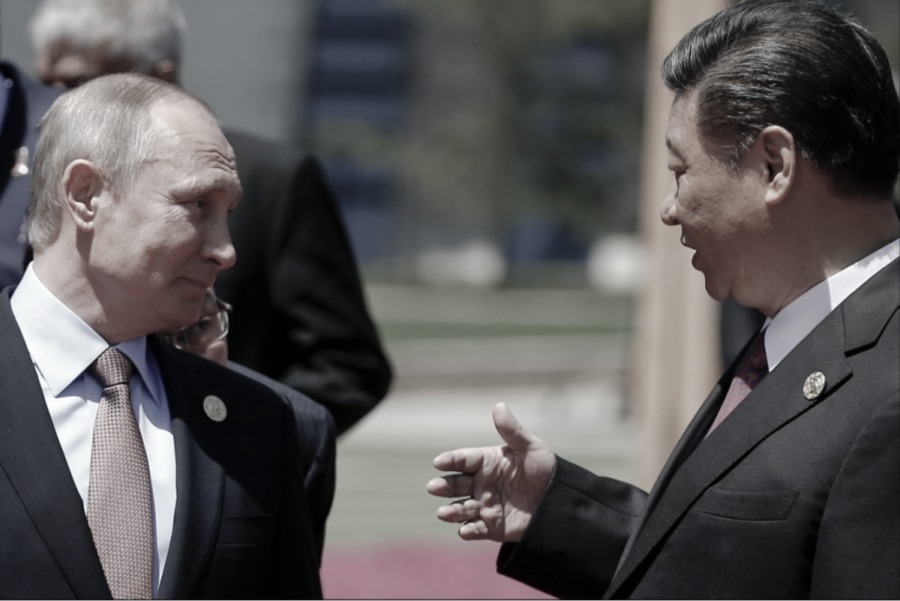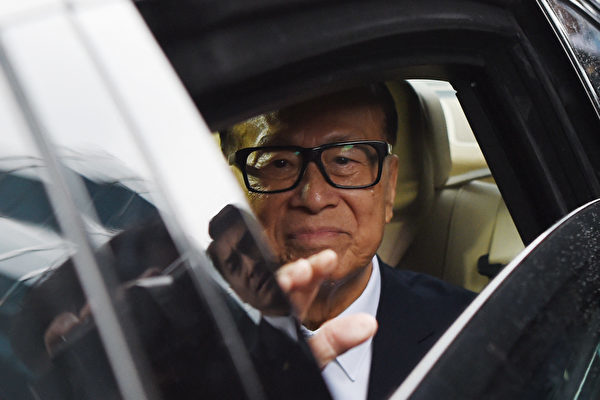File Photo: Putin and Xi Jinping Posing for a Photograph
[People News] Russia, as the “big brother,” has a long history of cooperation with China. Now, with Russia bogged down and weakened in the Russia–Ukraine war, the positions of the two sides have reversed. In addition, Beijing has been constantly manufacturing Taiwan Strait crises, drawing the world’s attention. These two major events have disturbed the global landscape and tied down the United States. For Chinese Communist Party (CCP) leader Xi Jinping, they have brought immense satisfaction to his vanity.
On August 8, Deutsche Welle, citing a report from Germany’s Bild, said it had obtained classified documents showing that Russia not only custom-developed an automated command system for China’s airborne troops, but would also provide a batch of airdropable weaponry. The mode of transport, combat deployment, and even parachuting details were clearly stipulated in the terms. The documents were stolen by the international hacker group “Black Moon,” and senior security officials in Germany confirmed their authenticity to Bild.
The “Black Moon” hacktivist group claimed on July 22 via X (formerly Twitter) that it had obtained a package of files showing that Russian arms export giant Rosoboronexport had signed a contract with CETC International Ltd., representing the CCP Central Military Commission. The contract concerned developing an “airborne automated command system” for the Chinese People’s Liberation Army (PLA). The contract was worth USD 34.907 million and was signed on April 26, 2021.
1. China–Russia cooperation exposed
According to Bild, the documents show that as early as April 2024, the two countries had reached an agreement for Rosoboronexport to develop and deliver an automated command and control system for China’s airborne forces (project name: MECH 208).
The project’s code name was “Sword 208,” and beyond system development, it included delivery of a batch of military equipment to the Chinese buyer.
Bild revealed the specific equipment and systems included in the contract: Il-78MK-90A and Il-76MD transport/airdrop aircraft; BMD-4M and BTR-MDM armoured vehicles; 2S25 125mm self-propelled anti-tank guns; 83T502-D command/reconnaissance vehicles; and PBS-955 platform-less parachute systems.
The contract also stipulated that all military materiel would be shipped by sea to Shanghai Port or by air to airports designated by the Chinese side.
One detail disclosed was: “The combat vehicles delivered under this contract can be carried and airdropped by the customer’s Il-78MK-90A or Il-76MD aircraft, whether already in service or modified.”
While Bild noted that the documents were highly classified and could not be fully verified, senior German security sources confirmed that the files obtained and made public by the hackers were genuine.
2. China–Russia cooperation on Taiwan invasion began as early as 2017
The “Black Moon” files suggest that China and Russia may have already reached agreements on military cooperation for an invasion of Taiwan as early as 2017 — and that cooperation has been quite deep.
Black Moon is a group of young hacktivists who, since April 2025, have been steadily releasing classified information about “axis of evil” states via X. The group has previously published design blueprints for the FAB-500 glide bomb racks used by Russia, Iranian state orders targeting non-Muslim countries, technical details of China’s kamikaze drones, and a “manifesto” outlining their political goals.
3. The real purpose of China–Russia cooperation — resources and vanity
Baden-Württemberg’s Centre for Political Education published an interview with the first vice-chairman of the Baden-Württemberg China Network (CNBW), Mr. Weber. Weber first visited China during his overseas studies in 1982 and served from 2018 to 2022 as general manager of the Baden-Württemberg International Economic and Technological Cooperation Company in Nanjing, representing his state’s interests in China.
According to Weber, the CCP has been extremely cautious, taking great pains to avoid creating the impression that it supports the war or is circumventing Western sanctions. At the same time, Beijing is exploiting the war to extract more benefits from Russia. The terms of the agreements heavily favour China — raw materials are very cheap, and Russia is lucky even to recover production costs. Journalist Jiang Wangzheng also revealed in a program that “the CCP supports Putin purely for material benefits, but these are things the general public cannot see.”
Weber believes Beijing chooses to work with Moscow because they share a common enemy — the United States. In the past, Russia always played the role of “great mentor,” setting the tone for China. Now the situation is reversed. Chinese people see Russia’s true nature — its economy overestimated, its military overstretched. Russia is not a key trade market for China; what the CCP values are its resources. At the same time, this reversal of power brings great vanity satisfaction to the CCP leadership.
4. CCP military buildup — Rutte is concerned about Taiwan
China–Russia cooperation has deepened the Taiwan Strait crisis. On July 23, at the NATO summit, Secretary General Mark Rutte said NATO was “very concerned about the situation in Taiwan” and believed that if Beijing decided to act against Taiwan, it would ensure its partner Russia simultaneously diverted Europe’s attention.
Rutte also noted that in recent years, more Chinese companies have climbed into the global top ten defence contractors, reflecting a rapid rise in China’s military-industrial capabilities: “They are obviously not doing this just to stage spectacular parades in Beijing.”
5. Xi Jinping uses “Taiwan invasion” to climb higher — and satisfy his vanity again
On June 22, Taiwan President Lai Ching-te, speaking at the Rotary International District 3490’s 9th Division joint meeting in New Taipei City, declared: “The People’s Republic of China has never owned Taiwan.”
President Lai said a country must have four elements — people, territory, government, and sovereignty. By any measure, Taiwan “is a country.” The CCP claims Taiwan is not a sovereign state and cites UN Resolution 2758 to assert ownership. But Resolution 2758 only addresses the issue of the “UN representative seat” and does not involve Taiwan. The world’s nations have stated clearly that Resolution 2758 does not touch Taiwan’s sovereignty.
Lai also stressed that after Japan’s surrender in WWII, the 1951 San Francisco Peace Treaty stipulated in Article 2(b) that “Japan renounces all right, title, and claim to Taiwan, the Pescadores, and other islands.” The treaty did not hand Taiwan over to the People’s Republic of China — which had been founded less than two years earlier — and the PRC has never governed Taiwan “for even one day.”
Lai’s remarks provoked intensified harassment from Beijing. In July 2025, the CCP activated the W121 connecting route, which could, in the future, allow military aircraft to “hide” under civilian air routes. Analysts warn that mixing civil and military flight paths will increase the chances of a PLA air strike and make Taiwan’s air defence identification and interception significantly more difficult.
However, analysts believe Beijing will not immediately attack Taiwan but will instead use Lai’s words as a future pretext. The strategy will be gradual encroachment rather than a sudden outbreak. Weber believes that after the 1989 Tiananmen massacre, Beijing was largely ignored by the world, but the Taiwan issue has once again put it in the global spotlight. The CCP has seized this as a chance to elevate itself to the ranks of major world powers — and once again satisfy Xi Jinping’s vanity.
(First published in People News)











News magazine bootstrap themes!
I like this themes, fast loading and look profesional
Thank you Carlos!
You're welcome!
Please support me with give positive rating!
Yes Sure!